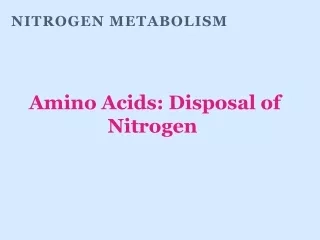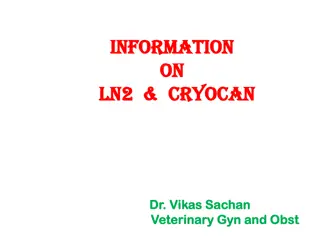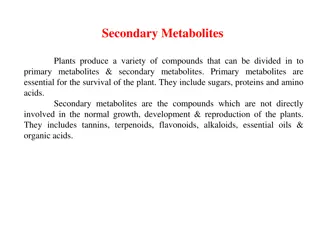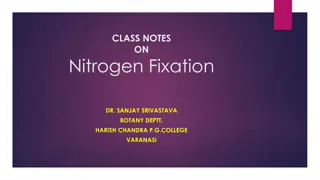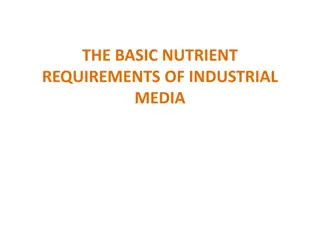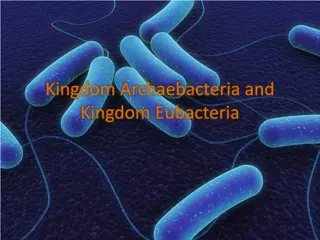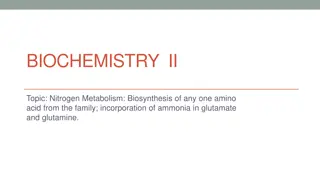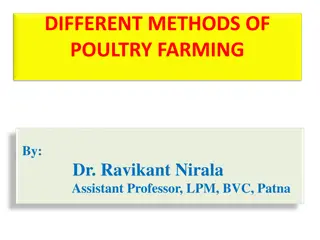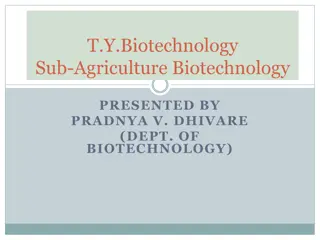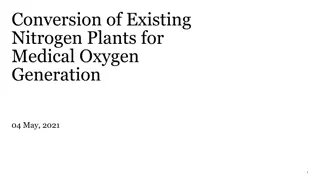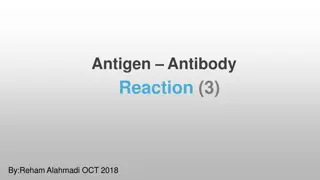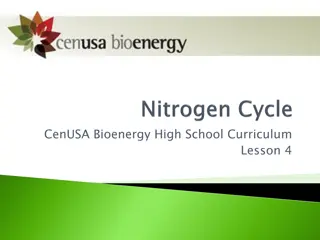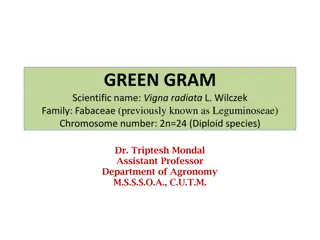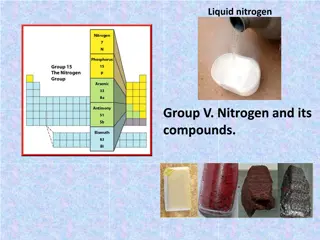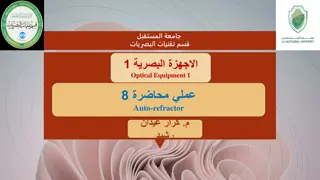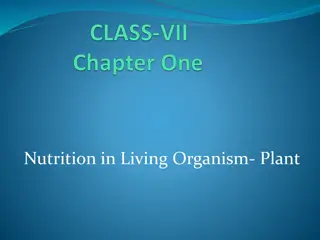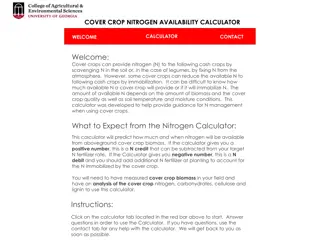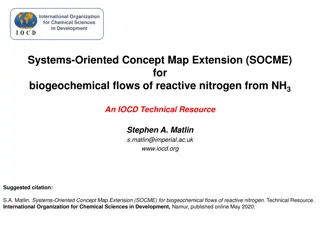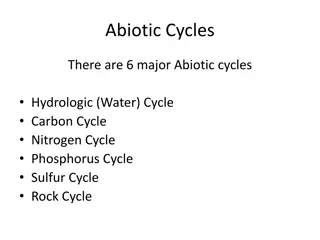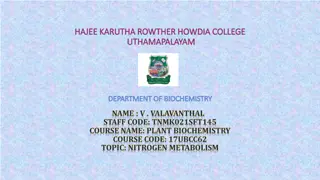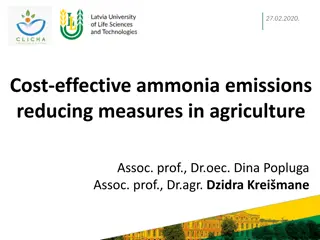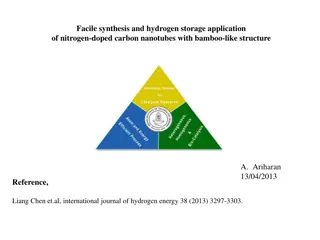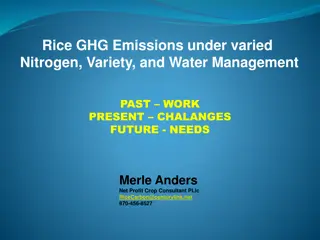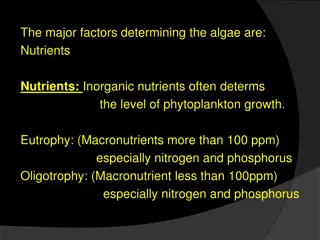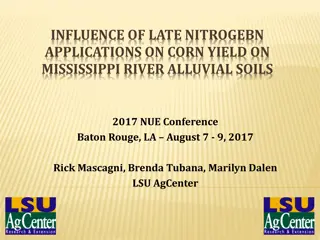Amino Acids: Disposal of Nitrogen
Overview of nitrogen metabolism with a focus on the disposal of nitrogen through amino acid catabolism. It explains the process of removing the α-amino groups from amino acids, the synthesis of urea, and the conversion of carbon skeletons to energy-producing pathways.
36 views • 65 slides
Essential Guidelines for Handling Liquid Nitrogen Containers
Learn about the safe handling and storage practices for liquid nitrogen containers such as LN2 cryocans and cylinders. Find out about the importance of maintaining vacuum systems, preventing frost lines, and ensuring proper transportation methods to avoid accidents and damage.
3 views • 20 slides
Understanding Plant Metabolites: Primary vs. Secondary & Their Biological Functions
Primary metabolites are crucial for plant survival, including sugars and amino acids, while secondary metabolites, like tannins, terpenoids, and flavonoids, play diverse roles such as protection from pathogens, pigmentation, and health benefits. Tannins offer antiviral and antibacterial effects, ter
1 views • 7 slides
Techniques of External Fracture Fixation in Veterinary Surgery
Dr. Archana Kumari, Asst. Professor and Junior Scientist in Veterinary Surgery and Radiology, presents various methods of external fracture fixation such as Robert Jones bandage, Ehmer sling, plaster cast, Thomas splints, walking cast, and hanging pin cast. The walking cast is indicated for fracture
1 views • 22 slides
Understanding Nitrogen Fixation Process in Plants
Nitrogen fixation is the conversion of atmospheric nitrogen into ammonia or nitrates by bacteria or industrial processes for plant absorption. Biological and abiological methods exist, with various bacteria and cyanobacteria involved in the process. Symbiotic relationships between these organisms an
1 views • 10 slides
Nutrient Requirements of Industrial Media
Microbiological media for industrial and laboratory purposes need to provide essential nutrients like carbon, nitrogen, minerals, growth factors, and water while avoiding growth-inhibitory substances. Carbon, nitrogen, minerals, and growth factors play key roles in supporting microbial growth, and t
0 views • 25 slides
Contrasting Kingdoms: Archaebacteria vs Eubacteria
Archaebacteria and Eubacteria are two distinct kingdoms of bacteria with unique characteristics. Archaebacteria, originating from Ancient Greek, are ancient organisms thriving in extreme conditions without peptidoglycan in their cell walls, while Eubacteria, the most common bacteria, have peptidogly
0 views • 11 slides
Understanding Nitrogen Metabolism: Amino Acid Biosynthesis and Ammonia Incorporation
Nitrogen metabolism is crucial in the biosynthesis of amino acids such as glutamate and glutamine, incorporating ammonia for various physiological processes. Ammonia is efficiently transported and stored using compounds like alanine and glutamate, playing a key role in the urea cycle. Glutamate, a v
0 views • 22 slides
Diverse Methods of Poultry Farming and Agricultural Practices
Poultry farming practices such as organic farming, nitrogen fixation, biodiversity management, and contract farming are discussed. Organic farming emphasizes holistic relationships in agriculture, promoting sustainable production. Nitrogen fixation and biodiversity management play essential roles in
0 views • 20 slides
Nitrogen Fixation and Symbiotic Relationship in Agriculture
Nitrogen fixation is a crucial process where nitrogen is converted into ammonia by nitrogen-fixing bacteria, benefiting plants like legumes. Symbiotic nitrogen fixation involves a mutualistic exchange between plants and bacteria, exemplified by Rhizobium species. This symbiosis leads to the conversi
0 views • 15 slides
Conversion of Nitrogen Plants for Oxygen Generation in Medical Industry
CPCB has identified industries with nitrogen plants that can be converted to produce oxygen without impacting normal operations. Conversion involves using Zeolite Molecular Sieve and PSA technology, with M/s. UPL Ltd successfully converting a plant at LG Rotary Hospital in Gujarat within 72 hours. S
0 views • 15 slides
Understanding Complement Fixation Test (CFT) in Immunology
Complement Fixation Test (CFT) is a key immunological method used to detect specific antibodies in a patient's serum by using complement proteins. This test involves the stages of incubation with antigens, inactivated serum, and complement, followed by the indicator stage using sheep red blood cells
1 views • 17 slides
Behavioral Data Analysis During Saccadic Eye Movement Task
Visual systems utilize saccades to focus on objects, impacting temporal perception. This study explores the effects of saccades and stimulus location on perceived time, presenting findings from an experiment on temporal perception mapping with fixed visual duration. The method of psychometric functi
0 views • 12 slides
Understanding the Nitrogen Cycle and Erosion Process
Nitrogen, a vital element found in living and non-living things, plays a key role in the nitrogen cycle where it moves between organisms and the environment. However, human activities like using nitrogen-rich fertilizers can lead to environmental issues like waterway pollution. In addition, the proc
2 views • 6 slides
Understanding Specimen Preparation in Electron Microscopy
Living things cannot survive in an electron microscope due to the high temperature generated by the electron beam, vacuum inside the microscope, and need for specimen preparation steps like fixation, dehydration, freezing, cutting, and mounting. Fixation involves stabilizing tissue with chemicals, d
3 views • 10 slides
Overview of Green Gram (Vigna radiata L.): Economic Importance, Origin, and Classification
Green gram, scientifically known as Vigna radiata L., is a highly digestible pulse crop with various uses such as consumption as whole grains or dal, making flour for cakes, and as fodder for cattle. It is grown widely in Southern Asia and other countries, with India being a significant producer. Gr
0 views • 23 slides
Understanding Nitrogen: Properties, Reactions, and Applications
Nitrogen, a colorless and odorless gas, is a vital element present in air and plays a crucial role in various chemical reactions. Known for its unreactive nature due to strong bonds, nitrogen is used in the manufacture of ammonia, fertilizers, and organic compounds. Discover how nitrogen is prepared
0 views • 43 slides
Understanding Histological Techniques for Tissue Preparation
Histological technique involves preparing tissue for microscopic examination, aiming to preserve the microscopic anatomy and structure of tissues. The process includes fixation, dehydration, cleaning, embedding, cutting, and staining. Key steps like fixation using fixative materials help prevent aut
0 views • 18 slides
Understanding Biofertilizers and Their Role in Sustainable Agriculture
Biofertilizers contain living microorganisms that promote plant growth by enhancing nutrient availability. Unlike conventional fertilizers, biofertilizers work through natural processes like nitrogen fixation and phosphorus solubilization. Research shows how mycorrhizal fungi can improve crop yield
0 views • 9 slides
Surface Water-Groundwater Interactions and Nitrogen Cycling in a Tidally Influenced River Study
Study on the dynamic interactions between surface water and groundwater in a tidal river, focusing on nitrogen cycling. The research highlights the impact of tidal fluctuations on bank storage, nitrogen transformation, and nutrient cycling. Findings suggest that river discharge affects the exchange
1 views • 16 slides
Understanding Auto-refractors in Optical Equipment
An auto-refractor is an automated system that uses light reflected off the retina to measure a patient's refractive error objectively. This technology is fast, safe, and easy to use, providing accurate prescriptions without the need for pupil dilation. While children may find it challenging to sit s
0 views • 15 slides
Maximizing Nitrogen Efficiency in In-Season Applications
This study explores the timing of in-season nitrogen applications in agriculture to optimize yield and minimize nitrogen loss. Results show that early application is crucial to reduce nitrogen loss susceptibility. The research includes key plant growth stages, such as physiological maturity and side
0 views • 30 slides
Understanding Nutrition in Plants and Their Relationship with the Environment
This educational content delves into the various modes of nutrition in plants, including heterotrophic and autotrophic nutrition, as well as saprotrophic and parasitic nutrition. It explains the process of photosynthesis, absorption of water through roots, oxygen production, and symbiotic relationsh
0 views • 13 slides
Evolution of N-Rich Strip Adoption in N Management
The adoption of N-Rich Strip has transformed nitrogen management practices over the years. Starting from small applications in 2003 to widespread utilization across acres in Oklahoma and Kansas, the confidence in this approach has grown significantly. Farmers are advised to monitor N-rich strips and
0 views • 17 slides
Cover Crop Nitrogen Availability Calculator
Cover crops can impact nitrogen availability for cash crops. This calculator helps estimate nitrogen availability from cover crop biomass, guiding N management decisions. It requires data on cover crop biomass and composition. Positive values suggest a nitrogen credit, while negative values indicate
0 views • 7 slides
Systems-Oriented Concept Map Extension for Reactive Nitrogen Flows
International Organization for Chemical Sciences in Development presents a Systems-Oriented Concept Map Extension (SOCME) focusing on biogeochemical flows of reactive nitrogen from NH3. The concept explores core reaction subsystems, energy input subsystems, equilibrium conditions, and the integratio
0 views • 11 slides
Effect of Microgravity on Nitrogen Fixation in Red Clover Study
Investigating the impact of microgravity on nitrogen fixation in red clover at Johnson County Central High School in Tecumseh, NE. The experiment aims to determine if clover exposed to space conditions fixates nitrogen similar to Earth conditions, crucial for growing food in space. Hypothesis, exper
0 views • 8 slides
Impact of Surgical Treatment on Physiotherapy Outcome in Femoral Neck Fracture Surgery
Early mobilisation post-hip fracture surgery plays a crucial role in patient outcomes. A study at Our Lady of Lourdes Hospital, Drogheda, compared the rehabilitation progress of patients based on the type of surgery received: arthroplasty or internal fixation. Results showed that arthroplasty patien
0 views • 4 slides
Effect of Sulfur Fertilization on Nitrogen Use Efficiency for Spring Wheat and Corn
This research project, conducted by Dr. Jasper M. Teboh and his team at NDSU, investigates the impact of sulfur fertilization on nitrogen use efficiency for spring wheat and corn in Minnesota and North Dakota. The study aims to determine if wheat or corn respond to sulfur application, how sulfur aff
0 views • 25 slides
Clinical Microbiology Techniques: Complement Fixation Test (CFT) in Diagnostic Practice
Complement Fixation Test (CFT) is a key technique in clinical microbiology, utilizing antigen-antibody complexes to fix complement for various immunological reactions. The test involves multiple steps and reagents, with guinea pig serum for complement activation. Standardization is crucial for accur
0 views • 46 slides
Microbial Transformations of Nitrogen in Soil: Factors, Forms, and Impact on Plant Nutrition
Understanding the microbial transformations of nitrogen in soil is crucial for optimizing plant nutrition. Factors such as climate, water supply, cultivation, soil texture, and depth influence the nitrogen content in soil. The different forms of soil nitrogen, including inorganic and organic compoun
0 views • 23 slides
Understanding Abiotic Cycles in Ecosystems: Hydrologic, Carbon, Nitrogen, and More
Abiotic cycles play a crucial role in regulating ecosystems. The hydrologic cycle involves processes like evaporation, condensation, precipitation, and transpiration. The carbon cycle relies on photosynthesis, respiration, and human activities like deforestation and burning fossil fuels. The nitroge
0 views • 20 slides
The Role of Nitrogen in Plant Biochemistry: Understanding Nitrogen Metabolism
Nitrogen is a crucial element in plant biochemistry, essential for protein synthesis and the formation of various organic compounds. This article explores the sources of nitrogen available to plants, including atmospheric nitrogen, nitrates, and organic nitrogen compounds. The importance of nitrogen
0 views • 15 slides
Understanding the Calvin Cycle in Photosynthesis
The Calvin Cycle is a crucial part of photosynthesis where sugar is synthesized from smaller molecules using ATP and NADPH. It involves three phases: Carbon fixation, Reduction, and Regeneration of the CO2 acceptor. Steps include Carbon Fixation, Reduction, and Regeneration of RuBP. The cycle ultima
0 views • 9 slides
Cost-effective Measures to Reduce Ammonia Emissions in Agriculture
Cost-effective strategies to reduce ammonia emissions in agriculture are crucial in Latvia, where a significant portion of emissions originate from the agricultural sector. The study focuses on potential measures, such as precise mineral fertilizer application, improved manure management, nitrogen f
0 views • 13 slides
Techniques in Ocular Examination for Gaze and Visual Fixation
Explore various techniques for assessing ocular alignment, range of motion, and eye movement in patients through sessions focusing on gaze testing, visual fixation, saccades, and smooth pursuit. Learn how to identify abnormalities such as nystagmus, saccadic movements, and pursuit asymmetries to aid
0 views • 6 slides
Nitrogen-Doped Carbon Nanotubes for Hydrogen Storage
Hydrogen is a promising energy carrier for the future, and efficient storage under ambient conditions is a key challenge. Nitrogen-doped carbon nanotubes show potential due to their unique structure and chemical properties. This study focuses on the facile synthesis and hydrogen storage application
0 views • 12 slides
Rice GHG Emissions under Varied Nitrogen, Variety, and Water Management Study in Arkansas
Detailed study on rice greenhouse gas emissions under varied nitrogen, variety, and water management treatments, focusing on nitrogen fertility, crop varieties, and water usage impact on methane and nitrous oxide emissions. Research examines optimal nitrogen rates for reduced global warming potentia
1 views • 18 slides
Factors Influencing Algae Growth in Water Ecosystems
Nutrients play a crucial role in algae growth, with inorganic nutrients like nitrogen and phosphorus being key factors. Algae require macroelements such as carbon, hydrogen, oxygen, sulfur, potassium, calcium, phosphorus, and nitrogen in large quantities, as well as microelements like iron, manganes
0 views • 16 slides
Influence of Late Nitrogen Applications on Corn Yield on Mississippi River Alluvial Soils - 2017 NUE Conference
Excessive rainfall in the lower Mississippi Delta can lead to late-season nitrogen deficiency in corn crops. Research conducted at the LSU AgCenter focused on evaluating the efficacy of supplemental nitrogen at late growth stages on Mississippi River alluvial soils. Field experiments from 2006 to 20
0 views • 19 slides
